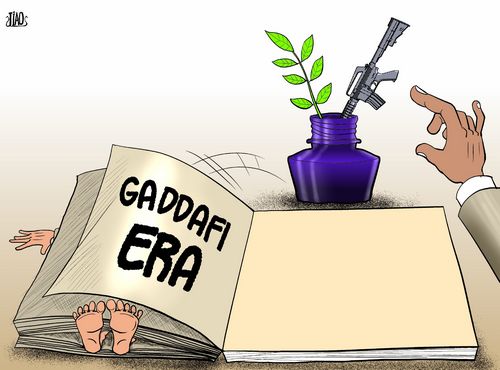From the ruins of Sirte
- By Heiko Khoo
 0 Comment(s)
0 Comment(s) Print
Print E-mail
China.org.cn, October 25, 2011
E-mail
China.org.cn, October 25, 2011
|
|
|
In your hand, TNC [By Jiao Haiyang/China.org.cn] |
The execution of Gaddafi, after he was found in a drain in the ruins of Sirte, was a signal for general rejoicing by 'rebel forces.' Their final victory came after months of bitter struggle. The Libyan people now hope that the revolution will herald a new beginning of democracy, freedom and a better life for all.
For 42 years Gaddafi's eccentricities shaped and warped Libya into what became known as a 'rogue state' with a unique economic, social and political structure. The original impulse for Gaddafi's coup against the King in 1969 was the pan-Arabic nationalism of Egypt's revolutionary President Gamal Abdel Nasser. The resources of the Arabs and North Africans would belong to the people. The imperialist powers and their stooges would be expelled and the peoples of the region would unite into a single state that would follow neither Washington nor Moscow.
Gaddafi set up a system of rule that was based on an economic foundation of public ownership of oil and gas, and where political power was in the hands of popular committees. Most small-scale enterprises were run by as co-ops and until recently 75% of the Libyan workforce worked for the state. This created an economic system controlled by a proportionately huge bureaucracy, only a small proportion of whom were engaged in productive activity. Immigrant labourers did much of the productive work.
A cradle to the grave welfare system like that in Cuba, or in pre-1989 Eastern Europe was established. The system created was one of general dependency on state employment and fear of the repressive reach of the state. The popular committees made peripheral decisions, while Gaddafi and his entourage of military, family and tribal allies exercised real power and made all major decisions, which the committees would then endorse.
The ideological system developed in Gaddafi's Green Book merged socialist, nationalist, anarchist and Islamic ideas, but fundamentally acted to justify this system of informal cliquish control over the official organs of 'popular power'. Gaddafi ruled over competing elites, leaning at one moment on one group to push through his policies, then on different group to push through another policy.
Go to Forum >>0 Comment(s)
 Add your comments...
Add your comments...
- User Name Required
- Your Comment
- Racist, abusive and off-topic comments may be removed by the moderator.






